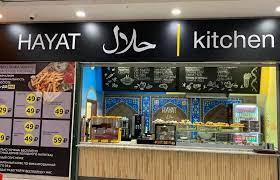Halal Franchise : 5 Thriving Lucrative Opportunity

The Halal Franchise industry has experienced remarkable growth globally, driven by the increasing demand for halal-certified products and services among Muslim consumers.
Within this dynamic market, halal franchising emerges as a promising avenue for entrepreneurs seeking to tap into this lucrative sector.
This article delves into the intricacies of halal franchising, exploring its opportunities, challenges, and essential considerations for success.
From understanding market trends to navigating certification requirements, join us as we unravel the key facets of the halal franchise landscape, offering insights and strategies for aspiring franchisees and investors.
Understanding the Halal Industry

The halal industry encompasses products and services that comply with Islamic dietary laws and principles. Rooted in religious traditions, halal denotes what is permissible or lawful according to Islamic teachings. While commonly associated with food, the concept of halal extends beyond cuisine to encompass various sectors, including finance, cosmetics, pharmaceuticals, and tourism.
Overview of Halal Principles:
- Halal principles derive from Islamic teachings, primarily the Quran and Sunnah (traditions of the Prophet Muhammad).
- Fundamental concepts include the prohibition of certain ingredients (such as pork and alcohol), adherence to ethical production practices, and humane treatment of animals.
Growth and Importance:
- The halal industry has witnessed significant growth globally, fueled by the expanding Muslim population and increased awareness of halal principles among consumers.
- With approximately 1.9 billion Muslims worldwide, representing a substantial consumer base, the halal market presents lucrative opportunities for businesses.
Market Diversity:
- The halal industry encompasses a diverse range of products and services, catering to various consumer needs and preferences.
- Key sectors include halal food and beverages, halal-certified cosmetics and personal care products, halal pharmaceuticals, Islamic finance, and halal travel and tourism.
Global Halal Certification:
- Halal certification ensures compliance with Islamic dietary laws and standards, providing assurance to consumers regarding the halal status of products and services.
- Various halal certification bodies operate worldwide, each adhering to specific guidelines and criteria.
Economic Impact:
- The halal industry contributes significantly to the global economy, driving job creation, investment opportunities, and economic development in halal-certified regions.
- Governments and businesses increasingly recognize the economic potential of the halal sector, leading to initiatives aimed at fostering its growth and competitiveness.
Consumer Trends and Preferences:
- Muslim consumers increasingly prioritize halal-certified products and services, reflecting a growing awareness of religious dietary requirements and ethical considerations.
- Non-Muslim consumers also show interest in halal products, perceiving them as symbols of quality, hygiene, and ethical production practices.
Understanding the halal industry provides a foundation for exploring halal franchising opportunities. As consumer demand for halal-certified offerings continues to rise, entrepreneurs and investors can leverage this trend to establish successful halal franchises across various sectors.
Exploring Franchise Opportunities
Franchising offers a structured business model wherein a franchisor grants franchisees the right to operate under its established brand, systems, and support. In the context of the halal industry, franchising presents a compelling avenue for entrepreneurs to enter the market and capitalize on the growing demand for halal-certified products and services. This section examines the various franchise opportunities available within the halal sector and outlines the steps involved in exploring and acquiring a halal franchise.
Types of Halal Franchises:
- Halal Food and Beverage Franchises: This category includes restaurants, cafes, fast-food outlets, and catering services offering halal-certified cuisine to consumers.
- Halal Retail Franchises: Retail franchises encompassing halal-certified products such as groceries, halal meat, snacks, and specialty items cater to the diverse needs of halal consumers.
- Halal Service Franchises: Service-based franchises may include halal-certified beauty salons, spas, travel agencies, and financial services tailored to Muslim consumers’ preferences.
Research and Due Diligence:
- Prospective franchisees should conduct thorough research to identify suitable franchising opportunities aligned with their interests, skills, and investment capabilities.
- Factors to consider include the reputation and track record of the franchisor, the viability of the business model, market demand, competition analysis, and franchise terms and fees.
Assessing Franchise Requirements:
- Franchise requirements vary depending on the franchisor and industry sector. Prospective franchisees should review and understand the franchisor’s eligibility criteria, training programs, operational guidelines, and support services.
- Compliance with halal certification standards and regulations is essential for halal food and beverage franchises, necessitating thorough understanding and adherence to halal principles in sourcing, preparation, and serving of food.
Financial Considerations:
- Acquiring a halal franchise involves financial investment, including franchise fees, initial capital outlay, ongoing royalties, and operational expenses.
- Prospective franchisees should develop a comprehensive financial plan, including budgeting, funding sources, projected revenue, and return on investment (ROI) analysis, to assess the financial feasibility of the franchise opportunity.
Franchise Agreement and Legal Aspects:
- Franchise agreements outline the rights, obligations, and responsibilities of both the franchisor and franchisee. It is crucial for prospective franchisees to review the franchise agreement carefully, seeking legal counsel if necessary, to understand the terms and implications.
- Legal considerations may include territory rights, intellectual property rights, non-compete clauses, dispute resolution mechanisms, and termination provisions.
Training and Support:
- Franchisors typically provide training and ongoing support to franchisees to ensure successful business operations. Training programs may cover product knowledge, operational procedures, marketing strategies, and customer service standards.
- Access to ongoing support resources, such as operational manuals, marketing materials, and franchisor assistance, enhances franchisees’ ability to manage and grow their halal franchises effectively.
Compliance and Certification Requirements
Ensuring compliance with halal certification standards is essential for halal franchises to maintain the integrity of their products and services and meet the expectations of Muslim consumers. This section explores the certification process, regulatory frameworks, and key considerations for halal franchisees to achieve and maintain halal certification.
Understanding Halal Certification:
- Halal certification verifies that products and services comply with Islamic dietary laws and are permissible for consumption according to Islamic principles.
- Certification is typically issued by recognized halal certification bodies, which assess and verify the halal status of ingredients, production processes, and facilities.
Halal Certification Process:
- The certification process involves several stages, including application, inspection, audit, and issuance of the halal certificate.
- Franchisees must submit detailed documentation regarding ingredients, sourcing practices, production methods, and facility hygiene to the certifying authority for evaluation.
Compliance with Halal Standards:
- Halal standards encompass various criteria, including the prohibition of certain ingredients (such as pork and alcohol), adherence to ethical production practices, and traceability of halal ingredients throughout the supply chain.
- Franchisees must ensure that all products and ingredients used in their operations meet halal requirements and are sourced from halal-certified suppliers.
Halal Assurance Systems:
- Implementing robust halal assurance systems is crucial for maintaining halal integrity and preventing contamination or cross-contamination with non-halal substances.
- Franchisees should establish comprehensive procedures for handling, storage, preparation, and serving of halal products, incorporating segregation measures and hygiene protocols.
Regulatory Frameworks:
- Regulatory frameworks governing halal certification vary by country and region, with some jurisdictions mandating halal certification for certain products or industries.
- Franchisees must stay informed about relevant regulations and standards applicable to their operations, ensuring compliance with legal requirements and consumer expectations.
Ongoing Compliance and Monitoring:
- Halal certification is not a one-time process but requires continuous monitoring and compliance to maintain halal integrity.
- Franchisees should implement regular inspections, audits, and quality control measures to uphold halal standards and address any non-compliance issues promptly.
Consumer Trust and Transparency:
- Halal certification enhances consumer trust and confidence in halal franchises, demonstrating a commitment to meeting religious and ethical dietary requirements.
- Transparent communication about halal certification status and processes fosters transparency and credibility, strengthening the franchise’s reputation within the Muslim community.
Market Analysis: Demand and Trends

Understanding the demand dynamics and emerging trends within the halal market is essential for halal franchisees to identify opportunities, assess market potential, and develop strategic business plans. This section provides an in-depth analysis of consumer demand, market trends, and key growth drivers shaping the halal industry landscape.
Global Halal Market Overview:
- The global halal market encompasses a wide range of products and services, including food and beverages, cosmetics, pharmaceuticals, finance, and tourism.
- Market research estimates the value of the global halal market to be in the trillions of dollars, driven by the growing Muslim population and increasing consumer awareness of halal principles.
Rising Muslim Population:
- The Muslim population is one of the fastest-growing demographic groups globally, with projections indicating continued growth in the coming years.
- As Muslim consumers constitute a significant market segment, their demand for halal-certified products and services drives market expansion and diversification.
Increasing Consumer Awareness:
- Awareness of halal principles and certification has grown significantly in recent years, fueled by factors such as globalization, social media, and information dissemination.
- Muslim consumers are increasingly discerning and informed, seeking halal-certified options that align with their religious beliefs and ethical preferences.
Expansion of Halal Markets:
- Halal markets are no longer limited to predominantly Muslim-majority countries but have expanded to encompass diverse regions and consumer demographics.
- Non-Muslim consumers also contribute to the growth of the halal market, driven by factors such as health consciousness, ethical considerations, and perceptions of halal as a symbol of quality and safety.
Diversity of Halal Products and Services:
- The halal market offers a diverse array of products and services catering to various consumer needs and preferences.
- Beyond traditional halal food and beverages, sectors such as halal cosmetics, personal care products, pharmaceuticals, and halal tourism are experiencing rapid growth and innovation.
Technology and Innovation:
- Technology plays a pivotal role in shaping the halal industry, facilitating e-commerce platforms, digital marketing strategies, and traceability solutions to meet consumer demands.
- Innovation in halal food processing, packaging, and distribution enhances product quality, safety, and shelf life, driving market competitiveness and consumer satisfaction.
Health and Wellness Trends:
- Health-conscious consumers increasingly seek halal-certified products perceived as natural, organic, and free from harmful additives or preservatives.
- Halal-certified products are often associated with higher quality, hygiene standards, and ethical production practices, resonating with consumers’ preferences for healthier and more sustainable options.
Operational Considerations for Halal Franchises
Effective operational management is essential for the success and sustainability of halal franchises. This section explores key operational considerations that franchisees must address to ensure compliance with halal standards, maintain quality, and deliver exceptional customer experiences.
Sourcing and Supply Chain Management:
- Franchisees must establish robust sourcing practices to ensure the procurement of halal-certified ingredients and products from reputable suppliers.
- Implementing traceability measures and conducting regular supplier audits help maintain the integrity of the halal supply chain and prevent contamination or substitution of non-halal ingredients.
Halal Ingredient Handling and Preparation:
- Adhering to halal principles in ingredient handling, storage, and preparation is paramount to maintaining halal integrity throughout the food production process.
- Franchisees should establish clear procedures and protocols for segregating halal and non-halal ingredients, minimizing the risk of cross-contamination and ensuring compliance with halal certification requirements.
Facility Design and Hygiene Standards:
- Maintaining a clean and hygienic environment is essential for halal franchises to uphold food safety and quality standards.
- Franchisees should design facilities with adequate space, equipment, and sanitation measures to facilitate efficient operations and comply with regulatory requirements.
Staff Training and Certification:
- Training staff members in halal principles, food handling practices, and customer service standards is critical to ensuring consistent adherence to halal standards and delivering superior service.
- Franchisees should provide ongoing training and certification programs to empower employees with the knowledge and skills necessary to maintain halal integrity and meet customer expectations.
Menu Development and Innovation:
- Developing a diverse and appealing menu of halal-certified offerings is key to attracting and retaining customers in competitive markets.
- Franchisees should regularly review and update their menus to incorporate new trends, seasonal specialties, and customer preferences while ensuring compliance with halal standards and nutritional requirements.
Quality Control and Assurance:
- Implementing robust quality control measures enables franchisees to monitor product quality, consistency, and compliance with halal standards.
- Franchisees should conduct regular inspections, product testing, and quality assurance audits to identify and address any deviations or non-compliance issues promptly.
Customer Experience and Engagement:
- Providing exceptional customer experiences fosters loyalty, satisfaction, and positive word-of-mouth referrals for halal franchises.
- Franchisees should prioritize customer service excellence, personalized interactions, and responsiveness to feedback to enhance the overall dining or shopping experience for halal consumers.
Marketing Strategies for Halal Franchise Success

Effective marketing strategies are essential for halal franchises to attract customers, build brand awareness, and drive sales. This section explores various marketing approaches and tactics that franchisees can leverage to promote their halal offerings and position their franchises for success in the competitive marketplace.
Target Audience Identification:
- Franchisees should identify and understand their target audience, including Muslim consumers, non-Muslim consumers interested in halal products, and specific demographic segments within their market area.
- Conducting market research and segmentation analysis helps franchisees tailor their marketing messages and strategies to resonate with the preferences and needs of their target audience.
Brand Positioning and Differentiation:
- Developing a strong brand identity and positioning statement enables halal franchises to differentiate themselves from competitors and communicate their unique value proposition to customers.
- Franchisees should emphasize factors such as halal certification, product quality, authenticity, ethical sourcing, and cultural relevance to build trust and loyalty among consumers.
Digital Marketing Channels:
- Leveraging digital marketing channels such as social media, websites, email marketing, and search engine optimization (SEO) allows halal franchises to reach a wider audience and engage with customers online.
- Franchisees can create compelling content, share customer testimonials, showcase menu offerings, and promote special promotions or events to drive traffic and conversions through digital platforms.
Community Engagement and Events:
- Engaging with the local community through sponsorships, partnerships, and participation in cultural or religious events strengthens the brand presence of halal franchises and fosters connections with customers.
- Hosting halal food festivals, cooking demonstrations, or charity initiatives provides opportunities for franchisees to showcase their offerings, interact with customers, and support community causes.
Halal Certification Promotion:
- Highlighting the halal certification status of products and services through signage, packaging labels, and marketing materials reassures consumers of their authenticity and compliance with halal standards.
- Franchisees can communicate the rigorous halal certification process, the ethical values upheld by halal franchises, and the benefits of choosing halal-certified options to educate and attract customers.
Influencer and Word-of-Mouth Marketing:
- Collaborating with influencers, bloggers, or community leaders who resonate with the target audience can amplify the reach and credibility of halal franchises through authentic endorsements and recommendations.
- Encouraging satisfied customers to share their experiences and reviews through word-of-mouth marketing and online platforms cultivates positive buzz and enhances brand reputation.
Loyalty Programs and Customer Retention:
- Implementing loyalty programs, discounts, and special offers incentivizes repeat purchases and fosters customer loyalty among patrons of halal franchises.
- Franchisees should prioritize personalized communication, customer feedback mechanisms, and responsive customer service to enhance retention and maximize lifetime customer value.
Conclusion
In conclusion, navigating the realm of halal franchising requires a nuanced understanding of market dynamics, operational intricacies, and effective marketing strategies.
By embracing halal principles, adhering to certification requirements, and prioritizing customer satisfaction, halal franchises can carve out a distinctive niche in the competitive marketplace.
As the global halal market continues to expand and evolve, franchisees who remain agile, innovative, and committed to delivering authentic halal experiences will be well-positioned to capitalize on emerging opportunities and achieve sustainable growth.
With a combination of strategic planning, diligent execution, and a dedication to quality and integrity, halal franchises can not only meet the needs of Muslim consumers but also appeal to a broader audience seeking halal-certified products and services.
Through collaboration, innovation, and a shared commitment to excellence, halal franchises can contribute to the ongoing diversification and enrichment of the halal industry, fostering economic prosperity and cultural inclusion in diverse communities worldwide.
Frequently Asked Questions (FAQs) for Halal Franchises:
- What is halal franchising?
- Halal franchising involves operating a business under an established brand within the halal industry, ensuring that products and services comply with Islamic dietary laws and principles.
- Why are halal franchises gaining popularity?
- Halal franchises are gaining popularity due to the increasing demand for halal-certified products and services among Muslim consumers worldwide. Additionally, non-Muslim consumers are also showing interest in halal options perceived as ethical, hygienic, and of high quality.
- What types of halal franchises are available?
- How can I ensure compliance with halal certification standards?
- To ensure compliance with halal certification standards, franchisees should source ingredients from halal-certified suppliers, implement halal assurance systems, maintain hygiene standards, and undergo regular audits by halal certification bodies.
- What are the key operational considerations for halal franchises?
- Key operational considerations for halal franchises include sourcing and supply chain management, halal ingredient handling and preparation, facility design and hygiene standards, staff training and certification, menu development and innovation, quality control and assurance, and customer experience and engagement.
- How can halal franchises effectively market their offerings?
- Halal franchises can effectively market their offerings through digital marketing channels, community engagement and events, promotion of halal certification status, influencer and word-of-mouth marketing, loyalty programs, and customer retention strategies.
- What are the benefits of halal franchising?
- The benefits of halal franchising include access to a growing market segment of Muslim consumers, differentiation in the marketplace, potential for increased revenue and profitability, and the opportunity to contribute to cultural diversity and inclusion.
- Are there any challenges associated with halal franchising?
- Challenges associated with halal franchising may include navigating complex certification processes, ensuring consistency and compliance across franchise locations, addressing cultural sensitivities, and managing competition in the marketplace.
- How can I learn more about halal franchising opportunities?
- Prospective franchisees can learn more about halal franchising opportunities by researching reputable franchisors, attending industry events and trade shows, consulting with halal certification bodies, and seeking guidance from experienced franchise consultants or advisors.
- What is the future outlook for halal franchises?
- The future outlook for halal franchises is promising, with continued growth expected in response to increasing consumer demand, evolving market trends, and advancements in halal certification and technology. As the halal market continues to expand globally, halal franchises are poised to play a significant role in meeting the needs of diverse consumers and driving innovation within the industry.



Leave a Reply
You must be logged in to post a comment.